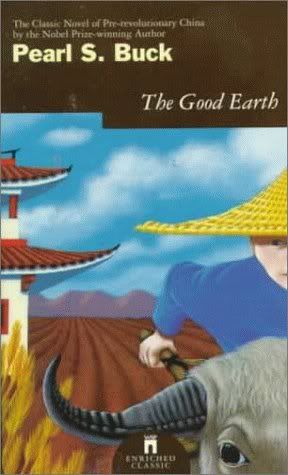
'The Good Earth," by Pearl S. Buck, Nobel-Prize winning author, is a terrific literary read. A gift from David's aunt when she sent me 10 of her favorite books. What a fantastic piece. Her writing is lyrical; I've only read this one book of hers but she deserved that Nobel just for this book. Published in 1931, "The Good Earth" was critically acclaimed and also caused its author a lot of criticism from China, a country that was more home to her an anyplace else, having grown up there with missionary parents.
But enough about Ms. Buck, although her story in itself is fascinating.
The book deals with a young farmer, Wang Lung (Dear Ms. Buck, forgive me for calling him 'Wang Chung' in my mind as I read), as he is about to be married to a local slave of a rich home. Wang's father insisted he not find his son a "pretty" maid who will not want to work, but will want fine things and to be pampered. Wang's father arranges he be wed to O-lan, a big, slow moving, 'dim-witted' girl who is a hard worker.
The arrangement was a wise choice, for while other men's wives just wanted, wanted, wanted, O-lan took great care to take care of their home, clean, cook and mend things, help with Wang's old father, work the fields they owned. Although he never once spoke of it to anyone including her, Wang Lung was proud to have a hard-working wife. This is a woman who bore his children on her own, and then went back on the fields to continue harvesting so they would not lose their crops.
I thought he was wonderful for thinking these things. He was an honest farmer and all he wanted was his land. He knew that though famine and bandits may come, no one can take away your land. He and O-lan even bought a parcel from the old Mansion she used to be a slave for. She was so proud to be a "success;" a married woman with land, crops and some silver.
Then camed the drought. People starved, people left, people hinted at others eating their own "slaves" as they called their daughters, as food. (Daughters were considered nothing but "future slaves" to some rich family by these farmers). The drought sent Wang Lung, his father, his pregnant wife and three kids to a city far away to try and survive. It is hinted that O-lan has killed the newborn child because it is a girl and girls are just another mouth to feed. In the city, they go to beg in the streets while Wang hires a richsha (her spelling) and makes enough money in an 18 hour day to just buy food for one day. Their youngest, a girl, is malnourished to the point of becoming mentally handicapped. They have hardships but always, Wang Lung remembers his land.
This section of the book very much reminded me of "The Grapes of Wrath." Wang Lung is trying so hard to care for his family and stay honest and true, just like the Joad family tried.
After over a year, and after going with a mob and ransacking a rich person's home and stealing money and jewels, they are able to afford the trip back home to their land. They rebuild and with the jewels by more of the rich people's land in town.
Then things change and you see Wang Lung getting full of hubris. He gains more land, more riches and begins to look down on people in his own town, in his own home. He looks with disgust at O-lan because she is big, her feet are not bound, she is not beautiful, and he treats her with contempt.
It reminded me of people you hear who say "If I come into money, it won't change me." Right. You change, slowly, imperceptibly at first, but you change. You get accustomed to finer things and suddenly think your "$&@* don't stink."
O-lan is wise. She may be quiet, but she is thoughtful. She knows how the world turns and oftentimes helps country bumpkin Wang out whe he least expects it. She stops him from selling his land when there was a drought. She knows how to beg to support her family, she knows where to look for the rich's hidden treasure, having lived in a mansion as a slave. She's patient, sturdy, strong. And Wang doesn't care because he does not desire her to be the "face" of this family. She's not beautiful enough for a successful man.
Wang takes in a concubine (read "tea-house tramp") as his second wife. A dainty, pretty thing for whom he builds a new addition to their already larger home. This trollop lounges all day and toys with Wang's lust for her body to do as she wishes. Poor O-lan. She bore his children and she loses her husband and his respect for her. Pearls he gaved to O-lan get stripped from her so he can give them as a gift to this new wife.
The story continues with his sons growing up to be "rich kids" who take all the hard work that Wang Lung and O-lan put in with his back and sweat for granted. They, Wang included, spend money like crazy, act like they are a rich regal family and totally forget their past.
The ending is a slow sad one. It's a greatly written story about this poor farmer who used to be happy with a faithful strong wife, a bowl of tea and rice for breakfast and enought harvest to be able to feed his family and have a little silver left over for emergencies, and how money changes everything.
No comments:
Post a Comment